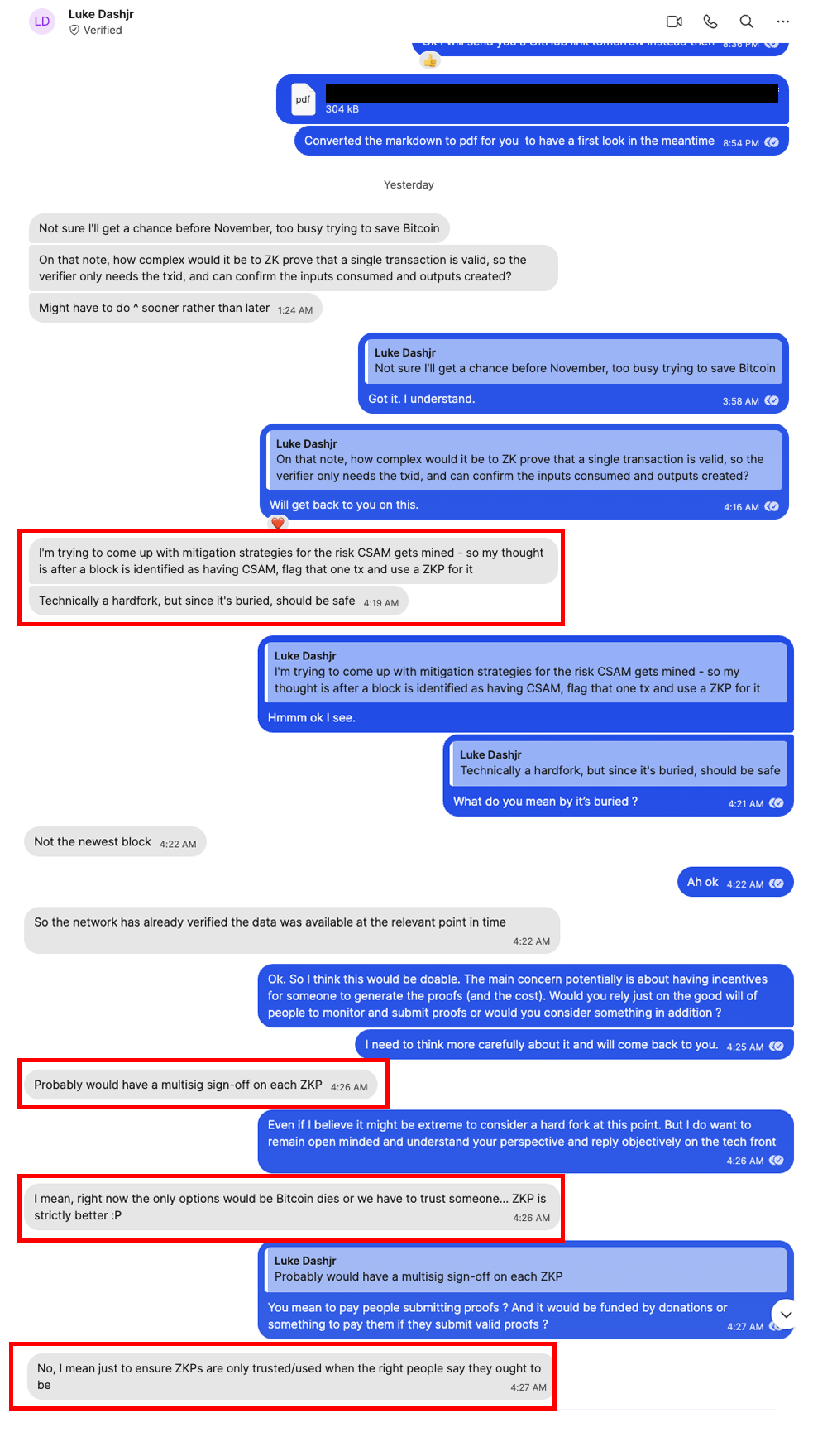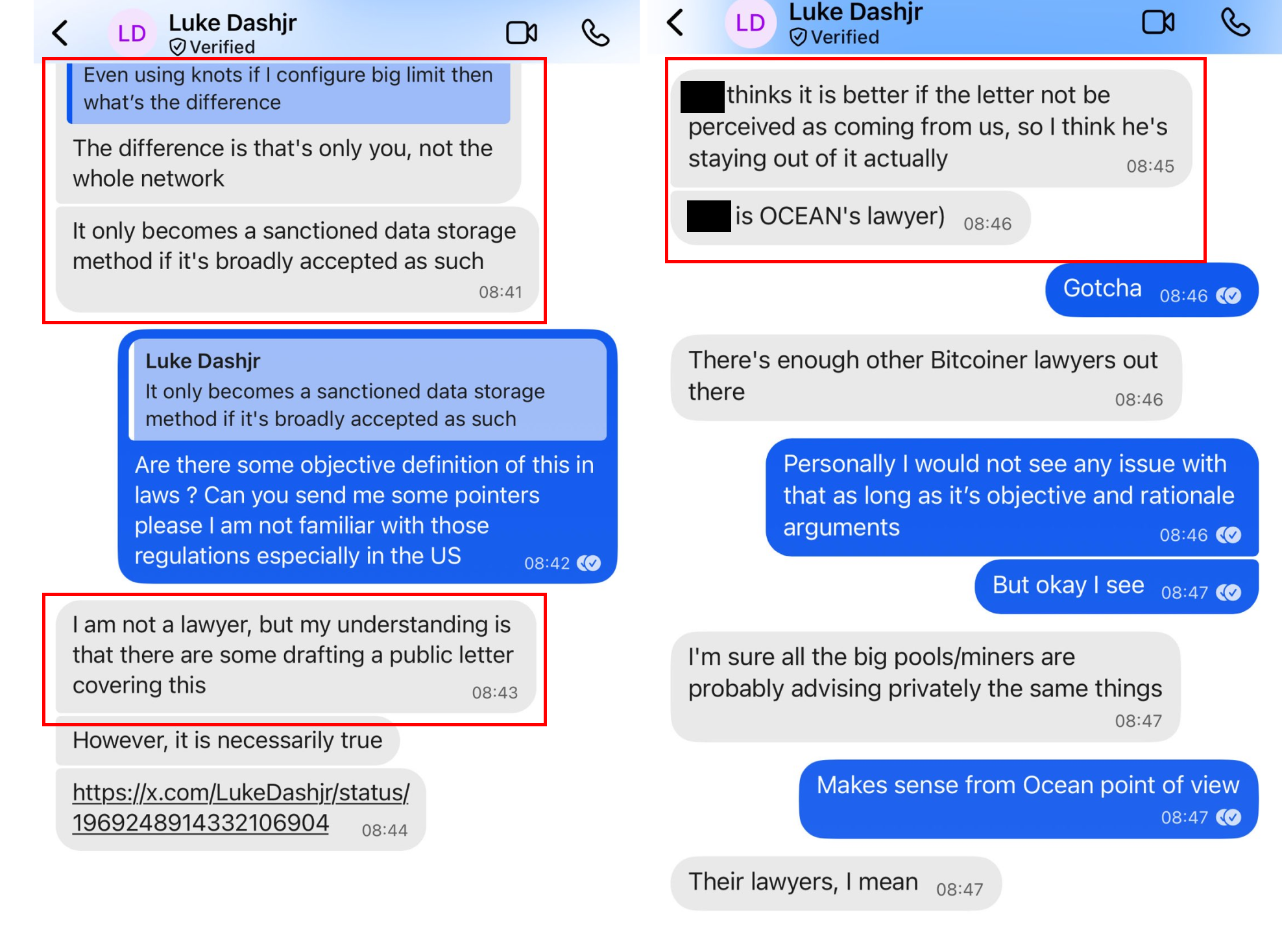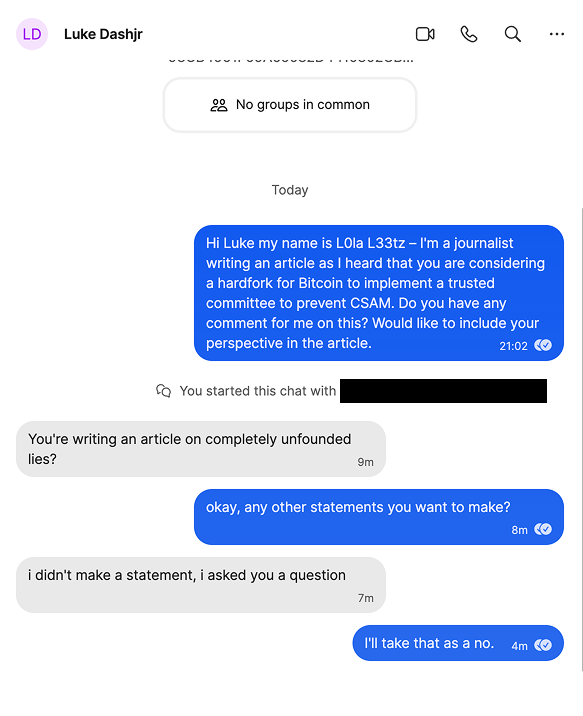It looks like there is just brainstorming for what to do if Bitcoin Core v30 is successful and we end up with CSAM in the blockchain putting node runners at risk of prosecution for hosting child porn. The reporter is being a bit disingenuous with the article and loses respect I had for The Rage while contributing to the effort of those trying to harm Bitcoin by allowing SPAM and inevitably CSAM being included in the blockchain. I like the idea of replacing CSAM with a zero knowledge proof, but a group of trusted people that can sign for changes to the blockchain is problematic, unless severely limited to just OP_RETURN’s which are not financial data for the transaction. As the current fiasco with Bitcoin Core shows, people can be co-opted. Perhaps the threat of OP_RETURN’s being removed will have a chilling effect on people wanting to use it for data and hashes off-chain, which might be beneficial for disincentivizing SPAM if the new OP_RETURN limit is upped to 100,000 bytes? Consequently, I appreciate what Luke Dashjr is doing and run his Bitcoin Knots on my nodes.
https://www.therage.co/leaked-luke-dashjr-bitcoin-hardfork/
Text messages shared with The Rage show that the Knots maintainer is considering a hardfork to implement a trusted multisig committee that can retrospectively alter the blockchain to remove illicit content.
There has been an ongoing dispute between supporters of the alternative node implementation Bitcoin Knots and supporters of the reference client Bitcoin Core. The dispute originally evolved out of Core’s consideration to increase the OP_RETURN size in order prevent non-monetary transactions from using more harmful methods on the blockchain, such as data in unspendable outputs, while Bitcoin Knots proponents argue that non-monetary data – first described as “spam” – has no place in Bitcoin, and that Core developers should not optimize for it.
To combat said “spam”, the Bitcoin Knots client – maintained by Bitcoin Core contributor Luke Dashjr – implements what it describes as filters, in which transactions which communicate non-monetary data are kept out of the Knots node’s mempool.
Over the past year, the discussion around Knots filters has grown increasingly out of control, as the narrative changed from protecting node operators from “spam” to protecting node operators from hosting Child Sexually Abusive Material (CSAM) – an argument that is technically unfeasible as long as node operators continue to run any node that follows the current consensus rules, as all nodes must host the same data once a block is approved.
In private messages shared with The Rage, Dashjr now appears to concede that policing the mempool is insufficient to stop nodes from hosting theoretical CSAM. Instead, he proposes the implementation of a multisig quorum on Bitcoin that grants a designated group of people the ability to retroactively alter data that is hosted on the blockchain.
By Dashjr’s description, the trusted multisig committee would review transactions and replace any data it identifies as CSAM with a zero-knowledge proof. Node operators could then remove said data from their nodes – altering their version of the blockchain – while continuing to be able to prove that the transaction that contained the affected data is valid.
“Right now the only options would be Bitcoin dies or we have to trust someone,” Dashjr writes. The proposed solution would require a consensus change, activating a Bitcoin hardfork.
In follow-up messages, Dashjr reveals that public letters are being drafted by third parties to seemingly support the sanctioning of illegal content on the entire Bitcoin network. On advice of OCEAN’s lawyer, the mining pool founded by Dashjr, the Knots team decided that “it is better if the letter not be perceived as coming from us”.
When asked for a comment by The Rage on the proposed hardfork, Dashjr asked “You’re writing an article on completely unfounded lies?”
Dashjr had no further comment for The Rage.
Dashjr’s proposal raises immediate concerns on altering the permissionless nature of Bitcoin, effectively invalidating the blockchain’s inherent censorship resistance. If the trusted committee enables node operators to remove CSAM data, it also gains the power to remove any other form of data it deems unfavorable.
In effect, Dashjr’s proposal could place node operators at risk of criminal penalties for non-compliance with the committee’s request for the removal of data. By setting the precedent that transactional data can be retroactively altered via a trusted committee, law enforcement may begin to demand censoring entire transactions they deem illicit, arguably opening the door for the enforcement of KYC/AML.
As Dashjr anticipates in the shared messages, the handling of illicit activity on Bitcoin is an active debate amongst policy makers, miners, and pool operators alike.
The authenticity of the material we received was verified via video proof. For transparency, we are sharing the relevant messages we obtained below.


